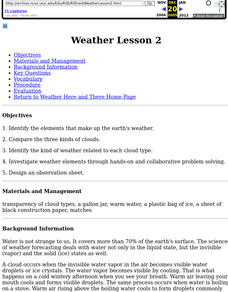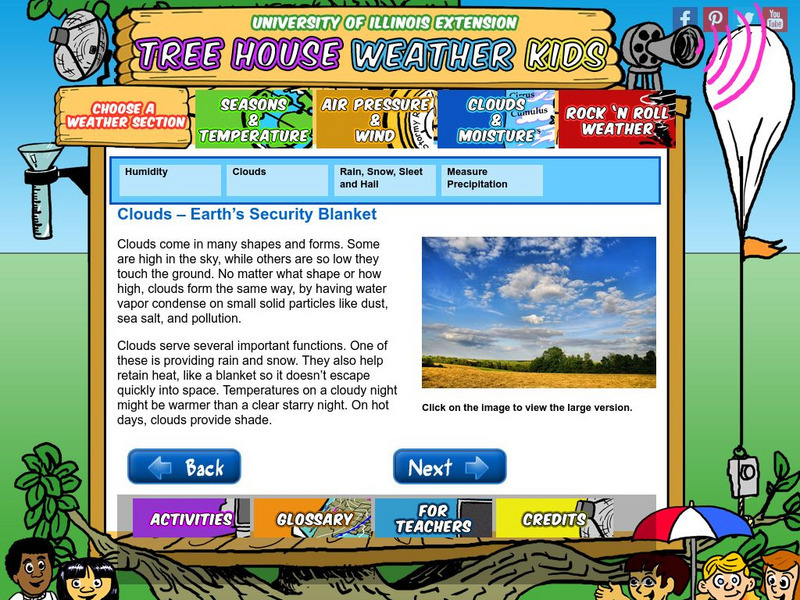NASA
The Types of Clouds and What They Mean
Learn to forecast the weather using cloud types. Budding meteorologists identify cloud types and learn to use a dichotomous key. As scholars develop observation and identification skills, they discover how different cloud types cause...
PBS
Cloud Clues
It's cloudy with a good chance of learning! An inquiry-based lesson begins with an exploration of transparent, translucent, and opaque materials. Young scientists then connect their learning to the different cloud types as they take the...
Teach Engineering
Backyard Weather Station
Challenge young meteorologists to apply their knowledge of weather to build their own weather stations. The resource provides the directions to build a weather station that contains a wind vane, barometer, thermometer, and rain gauge....
Sunburst Visual Media
Clouds
Support science instruction with a combination of engaging activities and skills-based worksheets that focus on clouds. Learners take part in grand discussions, write an acrostic poem, complete graphic organizers, solve word puzzles, and...
NASA
S’COOL Cloud Identification Chart
If you've ever wondered why clouds sometimes look so different, look no further than a classroom poster about cloud identification. It features pictures of clouds at high, mid, and low levels of altitude, as well as the name of each and...
Super Teacher Worksheets
Types of Clouds
What's the term for clouds that look like fluffy cotton balls? What about thick, gray clouds? Learn the names and descriptions for each type of cloud with a worksheet and activity. Learners read four columns of high-level, mid-level,...
North Carolina Museum of Natural Sciences
Weather Watch Activity Guide: Groundhog Day
Exactly what do groundhogs know about weather? Not as much as your science students will after completing these lessons and activities that cover everything from the earth's rotation and the creation of shadows, to cloud...
Curated OER
Weather Lesson 2
Students identify the elements that make up the earth's weather. Begin by having students pretend they are hiking along a mountain ridge. It's been sunny and warm all day, but you see a dark line of clouds moving from the west.
Curated OER
Classification of Clouds
Students view progressive slides of cloud formations and identify which type of cloud is shown as it forms. They estimate the cloud's height while viewing each image.
NASA
Nasa: Droplets: Kiwi Kids Cloud Identification Guide [Pdf]
Learn all about the different kinds of clouds in our atmosphere, how each forms, and specific details of each. Colored photos and an altitude cloud chart are included. PDF (requires Adobe Reader).
National Earth Science Teachers Association
Windows to the Universe: Cloud Types
Windows to the Universe provides a table with information about each cloud group, base height of each of the cloud groups, and links to information on the individual cloud types associated each group.
Other
K 3 Learning Pages: Web Resources Thunderstorms
Check out this comprehensive list of web resources on thunderstorms and safety. Students and teachers will benefit from the links found on this site.
University of Illinois
University of Illinois Extension: Tree House Weather Kids: Clouds and Moisture: Clouds: Earth's Security Blanket
Animated resource helps young researchers understand clouds, cloud formation, and types of clouds.
Other
Northern Michigan University: Cumulus Clouds
This brief site provides a connection between cumulus clouds and upcoming weather, explains why these clouds are white and puffy, and describes how these clouds are formed.











![Nasa: Droplets: Kiwi Kids Cloud Identification Guide [Pdf] Handout Nasa: Droplets: Kiwi Kids Cloud Identification Guide [Pdf] Handout](https://d15y2dacu3jp90.cloudfront.net/images/attachment_defaults/resource/large/FPO-knovation.png)


